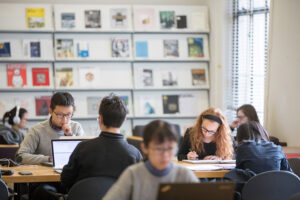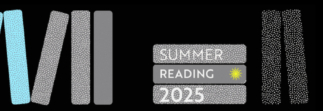
Photo: Bryce Vickmark
Last fall, the Institute-wide Task Force on the Future of Libraries released its preliminary report, with 10 recommendations to reenvision the academic library as an open global platform serving the needs of our communities. At a global institution like MIT, those communities are more far-reaching than ever, and in today’s world, equitable access to trusted information has never been more important.
A Resonant Vision
Following its release, the task force invited comments on its bold ambitions, which Director Chris Bourg characterized as a “moon shot for libraries.” MIT students, faculty, and staff responded through an open forum, emails to the task force, conversations on the open publishing platform PubPub, and social media. “Frankly, some of our academic library colleagues have been envious at the level of engagement we’ve experienced,” says Bourg.
The broader library and education communities have indeed taken notice. Media outlets including WGBH Boston Public Radio, Inside Higher Ed, and Swedish library publication Biblioteksbladet have featured the report, and Bourg and other Libraries staff have presented at conferences around the country. Many across the field are finding the report inspiring.
“MIT’s Task Force on the Future of Libraries has developed one of the most forward-looking, innovative visions I have seen from a research library in 30 years,” says Charles Henry, president of the Council on Library and Information Resources. “This report is a clear call for collective action on the challenges facing scholarly information and the organization of knowledge.”
What’s Next
The task force is using community input in finalizing the report, which will be done late this spring. Meanwhile, the Libraries staff is already forming teams to strategize about how to implement each of the 10 recommendations. An internal organizational engagement team has held multiple forums to discuss the roadmap ahead. “A lot of the conversation has been around the question of how we become the kind of organization we need to be in order to realize the vision of the report,” says team member Stephanie Hartman.
Bourg is confident the Libraries are well on their way: “Whether it’s reconfiguring spaces in Hayden Library, the strides we’ve made in open access, or the research we’ve done with our users around their needs for text mining or data visualization, we’re always experimenting. That’s just part of being MIT.”
Libraries Convene Space Planning Group
Chaired by Chris Bourg and J. Meejin Yoon, professor and head of the Department of Architecture, the group was charged with making recommendations for the renovations of the Libraries’ physical spaces across the Institute.
This spring, the group worked to identify needs for four core uses of library space:
- content/holdings: collections encompassing both physical and digital, general and archival
- learning: from individual study to group work
- meeting/events: whether conversations with friends, meetings between researchers, or film screenings, lectures, and other special events
- making/creating: the many ways students and scholars are engaged in the writing, making, and publishing of knowledge
The group includes School of Humanities, Arts, and Social Sciences faculty members Stephanie Frampton and Jeff Ravel and Dean Melissa Nobles (ex-officio); Robert Jaffe, Jane and Otto Morningstar Professor of Physics at the School of Science; Rafi Segal, associate professor of architecture and urbanism, School of Architecture and Planning; Greg Raposa, space administrator, Office of the Provost; and Tracy Gabridge, associate director for academic and community engagement at the Libraries.
“The task force conceived of libraries as not just containers for books, but as platforms for the innovative use, exchange, and creation of knowledge.” —J. Meiji Yoon

